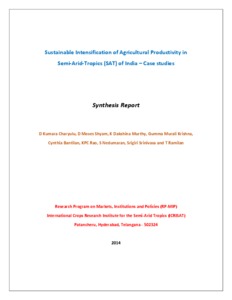Sustainable Intensification of Agricultural Productivity in Semi-Arid-Tropics (SAT) of India – Case studies
Abstract
Sustainable intensification is a term now much used in discussions around the future of agriculture and food security. The term actually dates back to the 1990s and was coined in the context of African agriculture, where yields are often very low, and environmental degradation a major concern. This pro-poor, smallholder oriented origin of the phrase is worth noting in the context of the current controversy around sustainable intensification. Sustainable intensification (SI) has been defined as a form of production wherein “yields are increased without adverse environmental impact and without the cultivation of more land”. In this sense, the term denotes an aspiration of what needs to be achieved, rather than a description of existing production systems, whether this be conventional high input-farming, or smallholder agriculture, or approaches based on organic methods. While the intensification of agriculture has long been the subject of analysis, sustainable intensification is a more recent concern

